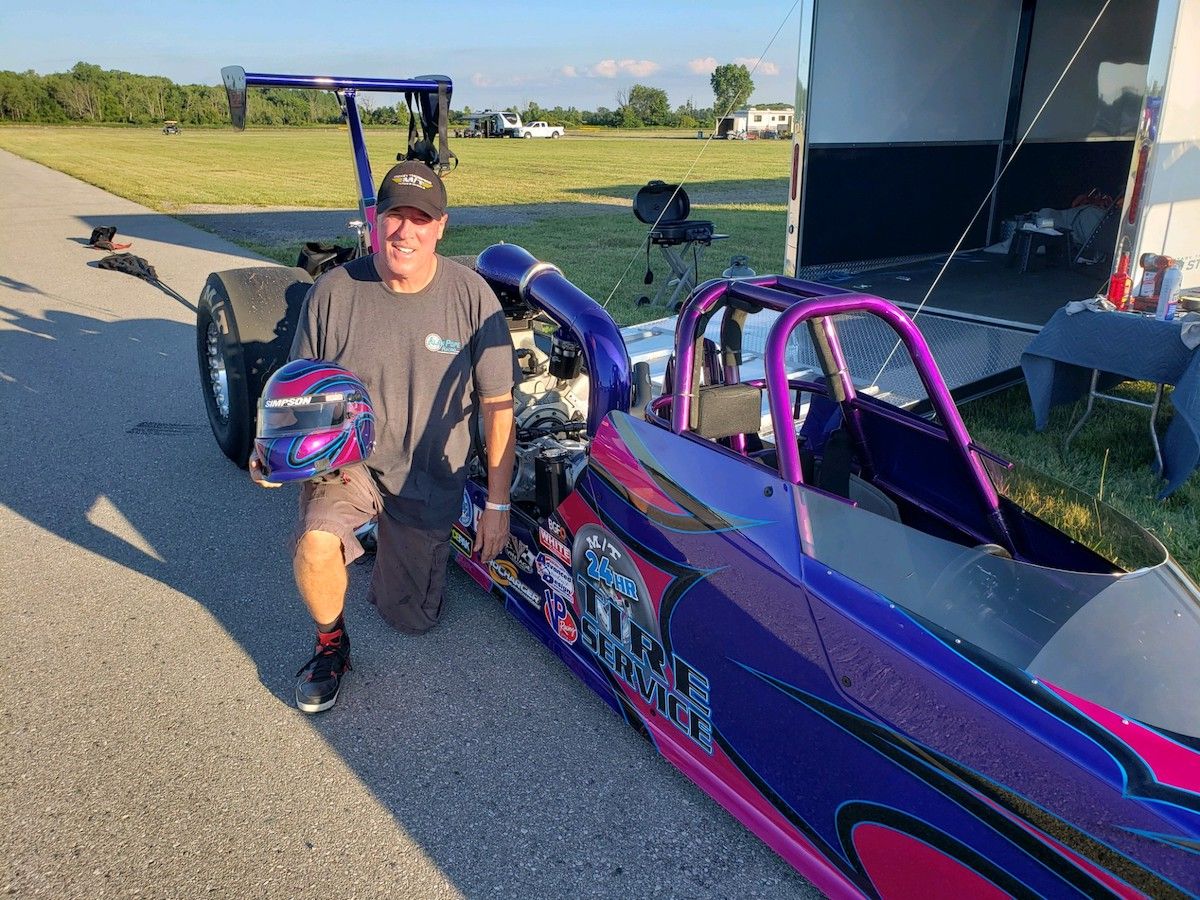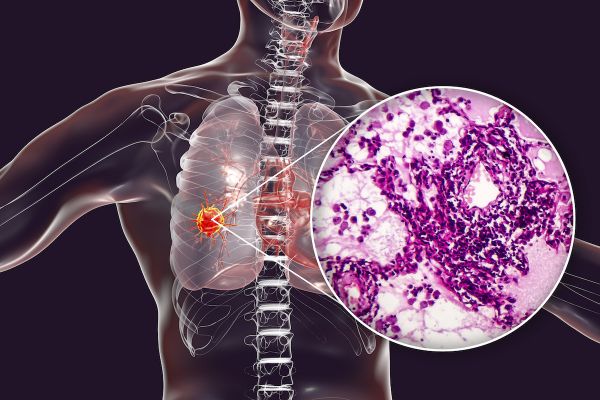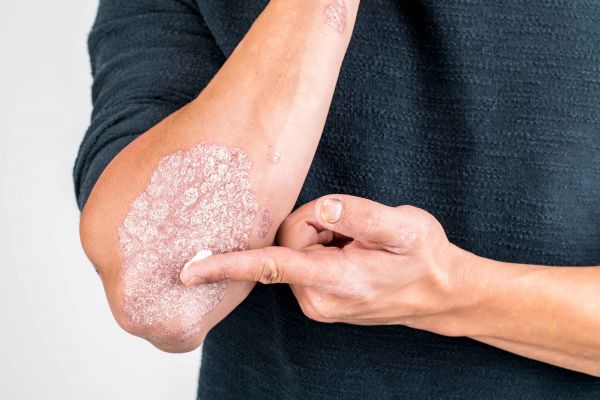Roswell Park dermatologists cinch the diagnosis of rare, puzzling condition
“It's not cancer.” For most people, hearing those words brings comfort and a sigh of relief. But for three years, those words also frustrated Mike Kalin. Despite symptoms that mimicked cancer, and a litany of painful and frustrating tests at many different facilities, no one could figure out the cause or the cure for Mike's medical issues. That is, until he walked into Roswell Park Comprehensive Cancer Center in late 2021. “It was ironic, because even though I didn’t have cancer, working together, the experts at Roswell Park were finally able to properly diagnose, treat and relieve my symptoms.”
A frustrating series of misdiagnoses
“Mike, are you feeling sick?” Those are the words that Mike, then age 56, remembers his physician assistant asking him during a routine physical in 2019. “I felt fine,” he recalls. But his bloodwork was anything but fine. “My white blood cell count — possibly indicating an infection or a bone marrow disorder – was high and my prostate-specific antigen (PSA) level of 12 was so elevated that I was immediately referred to a urologist to determine if I had prostate cancer.”
Mike describes his prostate biopsy as “painful and horrendous.” While the biopsy results showed no evidence of cancer, the CT scan of his prostate also revealed some swollen lymph nodes in his back. A needle biopsy was performed on the lymph nodes and, “again, it was painful and again I was told ‘It's not cancer,’” Mike says.
Next, he was sent to an immunologist. "He said my sedimentation (sed) rate, which can reveal inflammation and cancer in the body, was ‘through the roof,’ but he was unable to make a conclusive diagnosis.”
When Mike also developed an itchy rash on his legs and trunk and began rapidly losing weight, he went to two different dermatologists. “The first doctor did a skin biopsy and diagnosed me with hives and then called me back and said I might have syphilis. The second doctor prescribed huge doses of antihistamines, but they did nothing to relieve my symptoms. I saw a hematologist next who felt I might have lymphoma or leukemia and recommended that I have a bone marrow biopsy,” Mike recalls.
In total frustration, he went back to his primary care provider, with a simple question: “What is wrong with me? Why am I such a mess?” “My doctor didn't have an exact answer, but he had a good one: ‘I think you should see what the experts at Roswell Park have to say.’”
Roswell Park made a world of difference
Mike’s first appointment at Roswell Park was with Francisco Hernandez-Ilizaliturri, MD, Chief of Lymphoma. “Dr. Hernandez agreed that I should have a bone marrow biopsy. Fortunately, that can back negative for cancer. Unfortunately, my previous lymph node biopsy did not provide an adequate sample size for the most accurate diagnosis, so Dr. Hernandez recommended that I have another one,” Mike says. “Dr. Stephen Edge removed one of the swollen lymph nodes under my armpit, and again the result was negative.”
Even though he still had no positive diagnosis, Mike was already grateful for his care at Roswell Park. “Given how painful my previous biopsies were, I was amazed that the lymph node procedure at Roswell Park caused me almost no pain at all. The bone marrow biopsy was tougher, but I still wasn't in as much pain as I'd expected. That's one of the biggest things I noticed about Roswell Park. Their pain management techniques are outstanding, due in part to their state-of-the art equipment and the skill of their doctors and technicians,” he says. “I also appreciated that all of my appointments were at the same facility and that the doctors worked as a group to discuss the results of my various tests. I liked that, instead of one or two brains, at Roswell Park, there were many brilliant brains from various disciplines working together on my case.”
Roswell Park dermatologists treat non-cancer related skin conditions, too
Roswell’s Park’s dermatology team first learned about Mike in an email from Dr. Hernandez. Mike was first seen by Gyorgy Paragh, MD, and Megan Veneziano, PA-C, who quickly spotted an unrelated early-stage melanoma on Mike’s back, and also took a biopsy of his rash. The melanoma was later removed by Roswell Park dermatologist and Mohs surgeon Michael Bax, MD, but the mystery of the rash still remained.
“When dermatopathologist Alicia Goldenberg, MD showed Mike’s rash biopsy to us, my first thought was ‘it’s Schnitzler syndrome,’ a condition so rare that few of my colleagues had ever heard of it,” says dermatopathologist Susan Pei, MD, formerly of Roswell Park. In fact, since 1972, there have only been about 160 cases of this reported in medical literature. “But during my dermatology residency, one of my attending physicians saw a patient with this disease, and it was so rare, he presented the case at a national conference that I attended.”
A definitive diagnosis at last
As both a medical dermatologist and a dermatopathologist, Dr. Pei loves being a researcher and “detective” of sorts. “I sent some scientific articles about Schnitzler syndrome to my colleagues. I also asked that the patient’s prior skin biopsy from three years ago at another clinic be sent for our dermpaths to look at the slides. The prior skin biopsy was exactly the same as the new skin biopsy,” says Dr. Pei. “A Schnitzler syndrome rash is a ‘hive-like’ rash, with emphasis on the ‘like' part. It mimics hives but is not hives to the astute dermatologist,” Dr. Pei explains. "The night before I met Mike, I spent hours going through medical literature and textbooks in preparation. At his first appointment with me, I spent over an hour talking to him in clinic and taking a detailed history. My research confirmed that he had many classic Schnitzler symptoms. and along with his biopsy, the diagnosis could be confirmed with a simple blood test," says Dr. Pei.
“I think I set a record for number of vials of blood drawn at Roswell Park that day – 42 in all," Mike laughs.
Within days, Mike heard Dr. Pei say what he’d been hoping to hear for the last three years: “It's not cancer, it’s Schnitzler syndrome and it responds extremely well to certain medications.”
“Dr. Pei said that the medicine to treat Schnitzler syndrome is expensive and must be taken daily, but that she would fight for me should my insurance decline payment,” Mike says. Within days of starting medication, his symptoms dramatically improved, and he is now feeling the best he has felt in years. All his labs are normal, his rash is completely gone, and his PSA level is at a healthy 2.
Dr. Pei notes that while Schnitzler syndrome is not cancer, some patients do go on to develop lymphomas, so expert surveillance is important. Dr. Pei will continue to serve as Mike’s dermatologist and Dr. Hernandez will continue to monitor Mike’s blood labs.
For her part, Dr. Pei says “I am very glad I was able to help Mike. I want people to know that even though we work in a cancer center, the medical dermatologists at Roswell Park see patients with all kinds of skin conditions. Skin diseases are not just endemic to the skin; they can also be symptoms of internal conditions, such as immunologic conditions and gastrointestinal diseases, and that is where the role of medical dermatologists and skilled dermatopathogists is invaluable. I only wish Mike had been seen sooner by dermatology at Roswell Park because we could have saved him invasive procedures and three years of suffering.”
“I wish that too," laughs Mike.
Editor’s Note: Cancer patient outcomes and experiences may vary, even for those with the same type of cancer. An individual patient’s story should not be used as a prediction of how another patient will respond to treatment. Roswell Park is transparent about the survival rates of our patients as compared to national standards, and provides this information, when available, within the cancer type sections of this website.


